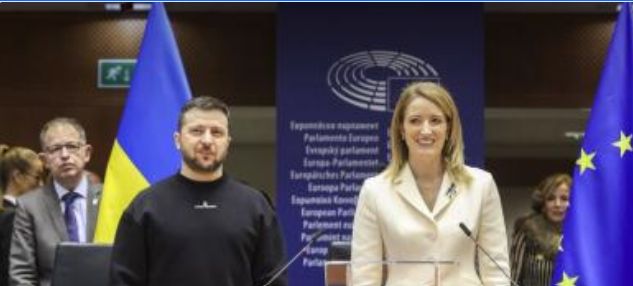By Eric Vandenbroeck
and co-workers
In January, an
eye-catching yurt providing free electricity, food, and tea appeared in Bucha, Ukraine, where Ukrainian forces
discovered horrific Russian war crimes when they retook the town last April. It
was the first of a set of “yurts of invincibility,” funded by private Kazakh
companies and erected by members of the Kazakh diaspora, which are being touted as manifestations of postcolonial and
anti-imperial solidarity between Kazakhstan and Ukraine. Initiatives supporting
Ukrainians in the same spirit as the yurts have emerged across countries that
were once under Moscow’s control.
Ukrainians and their
allies have been clear that a Russian invasion is an explicit act of imperial
aggression. They have sought to use this argument to galvanize support from
countries and peoples suffering from the violence and erasure of Russian
colonialism. The question is to what extent this framing resonates with the
millions of people in countries once part of the Soviet Union and the Russian
empire and how sustainable any nascent anti-colonial sentiment or solidarity
is.
In the West, the
terms “anti-colonial,” “decolonial,” and “postcolonial” are most often
associated with Africa, Latin America, and South Asia and the legacies of
British, French, Spanish, and Belgian colonialism. As Botakoz
Kassymbekova, assistant professor of modern history
at the University of Basel, recently wrote for Al Jazeera, the overlooking of Russian colonialism is largely
due to the Russocentric nature of Western knowledge
of Eastern Europe and Eurasia.
Ukrainian journalist
Maksym Eristavi has been working hard to challenge these assumptions
and foster connections between people and communities impacted by Russian
colonialism through Ukrainian Spaces, a podcast he founded with digital activist Valeriia Voshchevska. Responses
to the episodes, he said, had shown a real eagerness among listeners in the
region to engage with the idea of anti-colonial solidarity.
“The episodes we did
with Kazakh and Kyrgyz allies have been the most listened-to episodes in the
history of our project,” Eristavi said. “The first episodes we did with
Ukrainians would turn into group therapy sessions, a safe space to share our
generational trauma …. The same dynamic played out with our Central Asian
friends and allies. There were moments when we would feel the same and
intimately feel what they were trying to convey.”
This sense of
emotional kinship founded upon similarly traumatic experiences is emerging
after decades of Soviet propaganda, said Azamat Junisbai,
a Pitzer College professor of sociology focusing on Central Asia. The Soviet
Union was in many ways a successor to the Russian empire, given the privileged
position it granted to the Russian Soviet Federative Socialist Republic and
Russian culture and the way it treated minorities, he said. But the notion that
the Soviet Union could be a colonial power was deeply taboo in a Communist
state that trumpeted its supposedly anti-imperialist credentials. “Growing up
as a kid in Kazakhstan, the notion that we were a colony of Russia was never
mentioned,” Junisbai said. Decades of imbibing this
propaganda it has prevented many Kazakhs from acknowledging and resisting
Russian colonialism, although the process was slowly happening. Junisbai believes Russia’s full-scale invasion of Ukraine
“put this process on steroids,” he said.
Maria Yeryoma, a Belarusian media manager, said the invasion had
also brought the concepts of colonialism and anti-colonialism to the fore for
pro-democracy Belarusians. “We saw that narrative [being used by Ukrainians]
and felt that it was somewhat relatable to us,” she said.
While Russia’s war
has spread the anti-colonialism terms beyond the limited academic and cultural
circles to which they were previously confined, she says, their usage by
Belarusians is most often “borrowing” from the Ukrainian context rather than an
expression of any homegrown approach to the concepts. Inga and Alina,
Belarusian volunteers who had relocated to the Polish city of Przemysl to help Ukrainians fleeing across the border, also
rarely used the terms colonialism or anti-colonialism, more frequently
referring to “resisting Russian influence and aggression.”

Georgian journalist
and director of Open Caucasus Media Mariam Nikuradze said
Georgians also don’t use the terms, despite being the direct victims of Russian
military aggression in 2008. “We barely hear anything about Russian
colonialism,” she said. “I don’t remember previous government officials framing
it this way either …. I wouldn’t say Georgians saw the 2008 war as an act of
colonial aggression.”
Similarly, in my
conversation with Eka Gigauri, executive director of Transparency International Georgia, Russian “occupation” was the most commonly used
term, rather than Russian “colonialism,” although it often had similar
connotations. “We all understand that [Ukrainians] fight our fight as well,”
Gigauri said. “We have experienced the same disasters; we understand what it
means to be occupied by a country with whom you have nothing in common.”
Solidarity can mean
symbolic actions such as the gathering of Georgians and Ukrainians in Tbilisi,
Georgia, to decorate Christmas trees with their countries’ flags;
the performance of a Ukrainian song in the center of Minsk,
Belarus, by singer Meriem Herasimenka;
and the protest performance by activists from the Oyan,
Qazaqstan! (“Wake Up, Kazakhstan!”) group, in which
members lay
on the ground covered in Ukrainian flags outside the Russian embassy.
It can also mean tangible aid provided by ordinary citizens, as exemplified by
the yurts of invincibility. The evacuation of Ukrainian citizens to Poland by Belarusian
activist Andrei Kulakov in his eye-catching blue and yellow minibus is another
example of very real support.

But expressions of solidarity
can also be intangible. Eristavi said that, for him, anti-colonial solidarity
means amplifying each other’s stories.
“The foundation of
any colonial ideology is making you feel small and like whatever happened to
you is an isolated case,” he said. “It robs you of the understanding [that]
there is a larger scheme behind it. … When we share our stories and amplify
each other, the empire starts to crack.”
Junisbai said the Russian invasion marked a definitive
anti-colonial awakening for many Kazakhs. He compared the residual positive
attitudes towards Russia to a hot air balloon kept afloat by the older
generation’s nostalgia for the Soviet Union. “The war has punctured that
balloon,” he said. “It is coming down. There are hardly any people left who
remain under any illusions.”
Yet if Russia’s
invasion of Ukraine has become the engine of anti-colonial trends and
discourses in the region, they may run out of steam when the war ends.
Hanna Liubakova, a Belarusian journalist and activist, said
Belarusian President Alexander Lukashenko’s repressive regime was “a product of
Russian colonialism,” referencing the authoritarian leader’s adherence to
Soviet values and Russian President Vladimir Putin’s long-term support for
the dictator next door. “They are now in the same basket,” Liubakova
said. “Those who hate Putin hate Lukashenko, and those who hate Lukashenko hate
Putin.”
The connection
between Belarus’s democratic movement—the burgeoning of which preceded Russia’s
invasion of Ukraine by many years—and resistance to Russian colonialism
suggests that anti-colonial awareness in the country will continue to grow even
after the war’s conclusion. There is also hope in Uzbekistan that such
awareness will outlast the war. Temur Umarov, an expert on Central Asia and
fellow at the Carnegie Endowment for International Peace, said: “The narrative
right now is in the hands of young people. More than 50 percent of the
population [in Uzbekistan] is younger than 30, which means that they … have
many more questions about the Soviet Union and the Russian Empire, [such as]
why we are not talking about decolonization?”
A key tenet of
decolonization is moving away from political and cultural paradigms that center
on the imperial metropole, valorizing Indigenous and local experiences,
cultures, and identities. There is a tragic paradox in that much of what now
joins such disparate countries, providing the basis for solidarity, is a direct
result of colonial policies. As in the former colonies of the British
Empire, the language of the colonizer, Russian, continues—to varying degrees—to
dominate communication between these now-independent societies. A shared
language, however, does not mean entirely shared experiences. In the social and
political hierarchies of the Russian empire and the Soviet Union, an ethnic
Kazakh would have experienced colonial practices very differently from an ethnic Ukrainian. “Racism
was not so prominent in Russia’s colonization of Ukraine as it was in its
colonization of Central Asia,” Eristavi pointed out.
For now, the war
binds many people together in opposition to Moscow. But what might
anti-colonial solidarity look like in the post-war era? In this immensely
diverse region, the metropole provides a common enemy against which vastly
different countries can unite. The question is how much solidarity between
these countries can exist outside of this oppositional paradigm. On what basis
can these countries and peoples build and sustain solidarities with each other
if not the rejection of the old imperial master? Are these kinds of relations
necessary or desirable in the long term?
The two institutions
claiming to represent these countries’ “shared interests”—the Eurasian
Economic Union and the Collective
Security Treaty Organization—are dominated by Russia and primarily serve as
vessels for the Kremlin’s strategic agenda. While the governments of member
states such as Armenia, Belarus, and Kazakhstan remain dependent on Moscow
politically and economically—and, indeed, while they remain authoritarian or
hybrid regimes—these institutions will never embody the emerging anti-colonial
sentiments in their societies. The true potential for anti- and decolonial
solidarities in the region lies not with governments but with the grassroots.
People-to-people initiatives—of the kind we now see as a result of Russia’s
invasion of Ukraine—that bring ordinary citizens together and create spaces for
organic dialogue and mutual learning will provide the momentum for their
continued development.
Beyond the
commonalities imposed by the Soviet authorities, Eurasia’s cultural and
political landscape is immensely varied. While Belarusian culture may share
traits with Ukrainian culture, both are distinct from the cultures of Central
Asia. Last month, Ukrainian President Volodymyr Zelensky told the European Parliament that Ukraine is part of
Europe. “This is our Europe,” he said. “This is our way of life; for Ukraine,
it’s a way home.” The narrative that Ukraine is a historically European
nation—with all the value and civilizational judgments that term entails—separated
by Russia from its natural home is not something that can be adopted by Central
Asian countries that cannot aspire to EU membership.
Rather than assuming
commonalities, solidarity in the cultural sphere means negotiating differences
after decades of Russian-enforced homogeneity. Katie Boudreau
Morris, a scholar focusing
on migration and settler colonialism in Canada, wrote that settlers could only
engage in true solidarity with Indigenous communities through “constant and
uncomfortable engagement with a difference—an engagement based on mutual
recognition and connection.” That remains true even between colonized
communities; acknowledging and grappling with differences remains relevant not
to erase the variety of experiences.
Each society grapples
with the heritage of Russian dominance. Civil society could foster ongoing
solidarity by providing spaces where people from such immensely varied
backgrounds could share experiences and learn from one another as they seek to
reclaim their languages and distinct cultures. In Ukraine, thousands have turned away from Russian—even if it is their first
language—and switched to Ukrainian, with similar trends occurring in Belarus and Kazakhstan. In the process of decolonization, solidarity among
former Russian colonies can flourish.

Solidarity does not
mean sameness. The manifold initiatives that have emerged to support Ukraine
and its people across what was once the Russian empire demonstrate a readiness
to reject Moscow’s long shadow and fertile ground for grassroots cooperation
after the war ends. No matter in what terms one understands it, Russia’s
full-scale invasion has brought discussions of identity—individual, social, and
political—to the fore. We will begin to see where these conversations lead only
if and when Ukraine wins.
For updates click hompage here